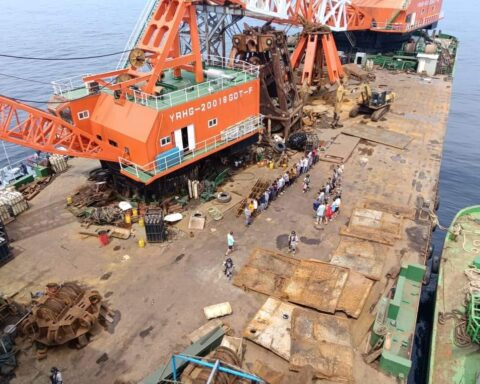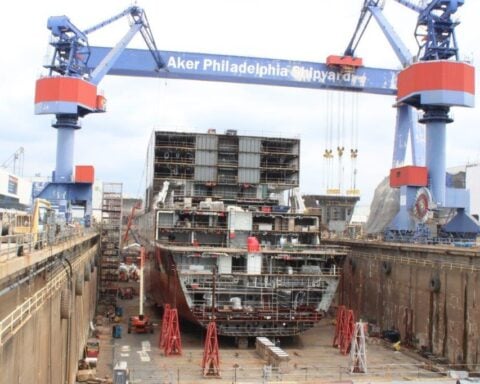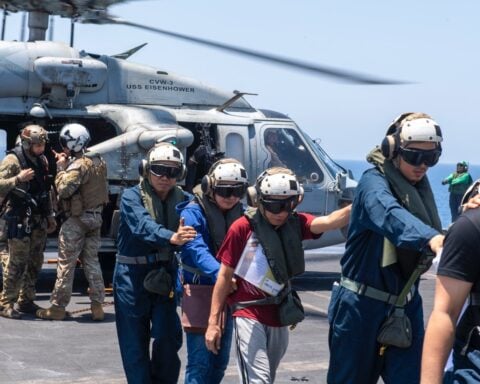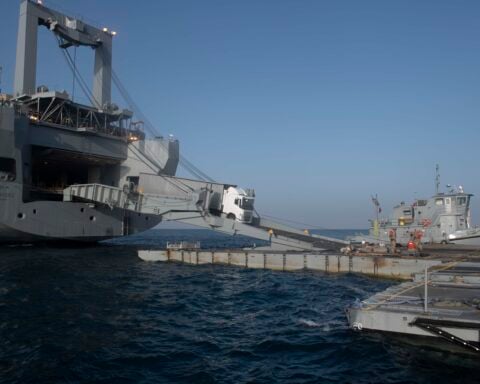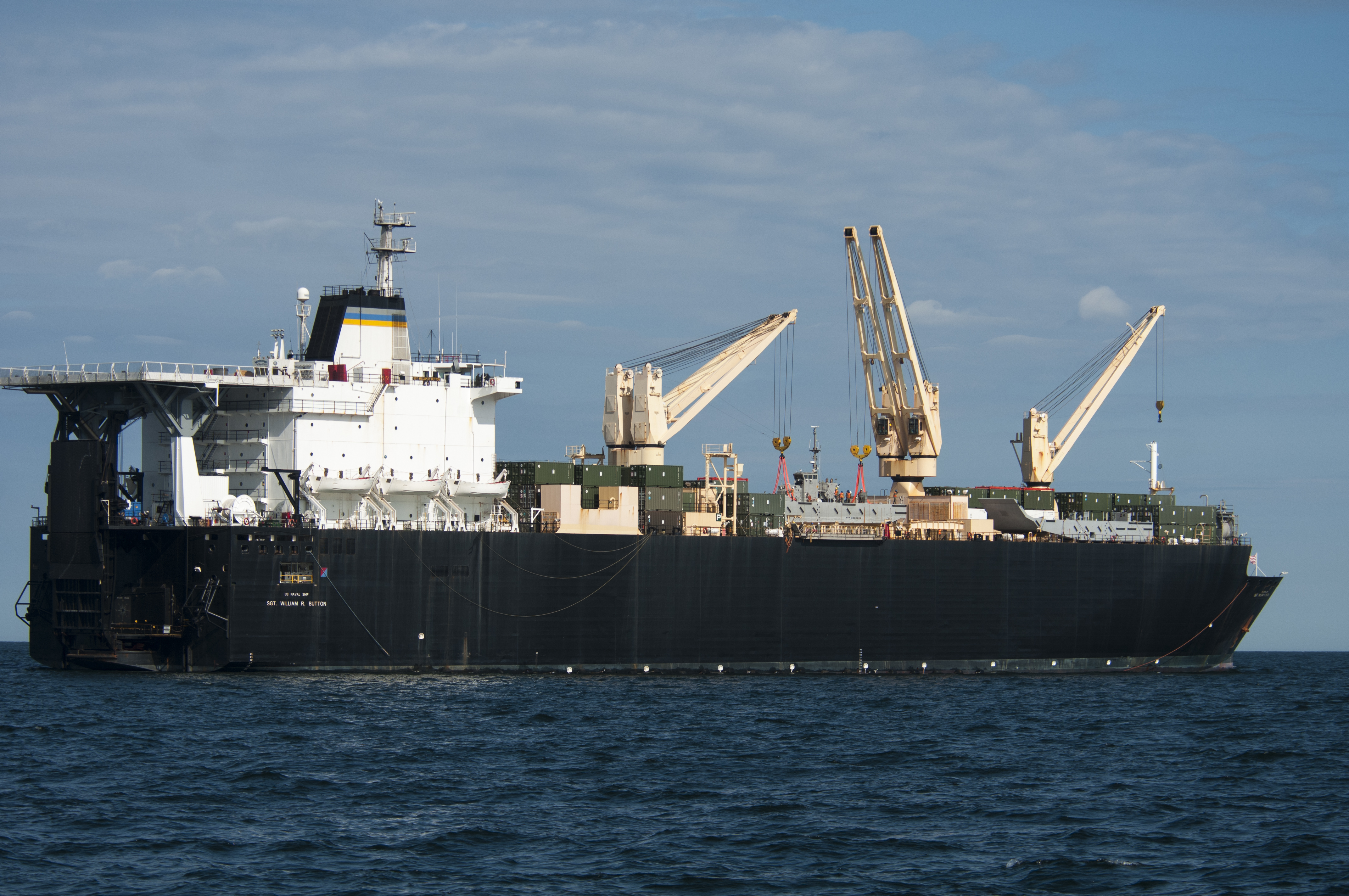
Civilian mariners are frustrated with stay-on-ship measures put in place to prevent COVID-19 outbreaks and their unions have filed a formal grievance with Military Sealift Command, even as MSC has been touting the extreme care it’s taken to avoid getting its employees sick or spreading the illness to warships they resupply at sea.
On March 21, MSC Commander Rear Adm. Michael Wettlaufer issued a “gangway up order,” stopping the movement of civilian mariners (CIVMARs) on and off the ship for those MSC ships pierside in the United States.
When that order came out, many were caught off guard, Sal Mercogliano, a former MSC mariner and a history professor at Campbell University, explained to USNI News: civilian mariners couldn’t go home and pack a bag with more clothes, medicines and other necessities to live on the ship indefinitely, and even some cars were towed that couldn’t be moved in a timely manner.
Mercogliano said that typically civilian mariners would have work hours and liberty hours while in port, and they’d be allowed to go home, see their families, run errands during their liberty time. No movement off the vessel at all is allowed under the March 21 order.
The order had relatively little effect on those ships deployed around the globe, which have separately been told to limit port calls to only those necessary for resupply or maintenance, and to limit personnel movement off the ship even during those necessary stops.
But “if you’re on an oiler in Norfolk, where a lot of those guys and women live,” then the order is much tougher to take, Mercogliano said. Adding to the frustration is that the MSC CIVMARs cannot leave the ship, but uniformed military personnel and contractors are coming and going from the ship. Though they are supposed to be following Navy and Centers for Disease Control and Prevention (CDC) guidelines such as wearing personal protective equipment and social distancing, multiple CIVMARs sent USNI News anonymous emails saying they felt they were being kept prisoner in what was supposed to be a clean bubble but which actually wasn’t a healthy environment due to the number of other people coming aboard every day.
Wettlaufer only has command of the civilian mariners in MSC and cannot set policy for uniformed sailors assigned to MSC ships as part of hybrid military/civilian crews, for example, or for other activities directed by local base and geographic fleet leaders. Mercogliano praised MSC’s firm actions to limit the spread of the virus, but he said “the perception was that the same sort of orders weren’t being applied even-handedly” to sailors and contractors and that “it creates a very almost second-class citizen situation onboard: they don’t think they’re being treated the same as other personnel onboard” in terms of their ability to see their families, take care of medical appointments and other needs.
As a result, the unions that represent these civilian mariners are taking action, as reported today in a Project on Government Oversight investigation.
According to one of the grievances, “The Marine Engineers’ Beneficial Association (MEBA) hereby files this Association Grievance on behalf of all MEBA bargaining unit members adversely impacted by the arbitrary and capricious CIVMAR-only liberty restriction directed by MSC’s gangway up order effected on 21 March 2020. … All military personnel, MSC Port Engineers, other MSC, Navy, DOD civilians, contractors, and all other personnel across the MSC/Navy enterprise- except MSC CIVMARS – working in the same vicinity aboard USS and USNS ships and ashore are allowed to disembark and enjoy liberty after working hours.”
It notes that MSC took actions beyond the recommendations of local and state health officials and that MSC CIVMARs were uniquely affected in a way that other military personnel and first responders were not. Other complaints include not being given time to take action before the order went into effect “to avoid having their vehicles towed from pier parking lots, running out of daily medications, to obtain personal hygiene products, to allow for trips to on-base NEX, etc;” not having restrictions applied to all personnel to achieve a full bubble of protection to keep the coronavirus out; not allowing CIVMARs to leave for urgent physical and mental health appointments; and not being allowed off the ship to obtain face masks but subsequently being told they must wear them, forcing some personnel to cut up their own clothing to make masks to stay safe and follow regulations.
“[MSC] may restrict CIVMAR liberty in unsafe conditions without entitled premium pay/liberty restriction pay. But if the restriction is not due to unsafe conditions (that is, is arbitrary and capricious), the shore-liberty restriction still stands, but MSC CIVMARS are entitled to premium pay/liberty restriction compensation pursuant to the parties’ negotiated agreement,” the grievance reads. However, USNI News understands that there is some dispute as to whether that confinement pay actually applies in this case, and that will be part of the litigation going forward.
USNI News reached out to the three unions representing CIVMARs, but none provided comment.
MSC Commander Wettlaufer told USNI News last week that the command “went as aggressively as we possibly could go very early to drive down the risk,” and that the lack of cases of COVID-19 on deployed ships has proven “we have been doing all the right things.”
To date, there are still no cases of COVID-19 on deployed ships in the Combat Logistics Force that delivers supplies and fuel to deployed warships, MSC spokesman Tom Van Leunen told USNI News today. Three cases have emerged on oiler USNS Leroy Grumman (T-AO-195), which is is in Boston Ship Repair for maintenance, since the time of USNI News’ interview with Wettlaufer. Two CIVMARs from hospital ship USNI Comfort (T-AH-20) contracted the disease in March, as the ship was getting prepped to set sail and head to New York, but those two have recovered, he said.
Van Leunen told USNI News today that “MSC mariners are administratively controlled by MSC, while sailors are administratively controlled by different Navy commands. MSC continues to work with the leadership of each of those ships to ensure all crewmembers, uniformed and civilian, are protected. This action protects our crews, limits COVID-19 outbreaks on our ships, and preserves the ability of our ships and crews to get underway and execute their worldwide missions.”
Additionally, he said, “as for contractors, again we are doing everything we can to minimize the access of contractors to our ships unless absolutely necessary to repair or install critical equipment. All personnel accessing or embarking the ship are screened using an MSC Area Command-provided [area of operations]-specific COVID-19 screening questionnaire. Personnel who are identified as being at risk for COVID-19 infection are not permitted on board. Once aboard, PPE is required and the minimum number of personnel required to assist will accompany the contractor.”
Wettlaufer said during the interview that MSC had invested in created a “bubble to bubble transfer” system that put CIVMARs in a 14-day quarantine period and then kept them isolated from the outside population while they made their way to their assigned ship. Van Leunen added today that MSC was using that transfer system to get shipboard reliefs for CIVMARs deployed worldwide out into theater.
Mercogliano noted that the CIVMARs often work on a ship for four months before having leave time, compared to only a month or two at sea in the commercial shipping industry, so any delay in getting a replacement aboard and being able to go home on leave may be more acutely felt.


